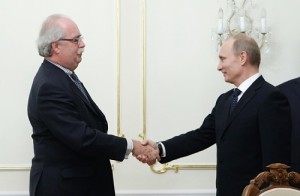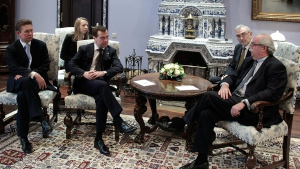Was Total’s Chief Executive Christophe de Margerie Killed for Opposing Petrodollar and Sanctions Against Russia?

A small private plane, a Falcon 50 en route to Paris, crashed on takeoff Tuesday night at the Vnukovo airport. Witnesses claim the pilots did not notice a snowplow on the runway. Everyone on board was killed – the two pilots, a flight attendant, and the sole passenger, Christophe de Margerie, the chief executive of Total, France’s largest oil company.
Sources from the Russian Investigative Committee report that they are currently weighing four potential explanations for the accident: pilot error, dispatcher error, misconduct on the part of the snowplow driver, or weather conditions – some parts of the Moscow region were shrouded in fog that night.
The investigation released a statement claiming that the snowplow driver, Vladimir Martynenko, had been intoxicated. The plane crash at Vnukovo occurred when the wing of the private Falcon 50 jet collided with the snowplow, which, according to the media “was sitting at the intersection of two runways, in a no-access area.” Sources from various media outlets familiar with the details of the crash reported: “The captain of the aircraft decided to go ahead and try to complete his takeoff. But he did not have enough speed. The front wheel of the business jet’s chassis clipped the snowplow, which led to the catastrophe.”
But, according to information from the lawyers and the airport service bureau, the driver, Mr. Martynenko, was very experienced, with a long work history, and was completely sober. He had also passed the usual, mandatory medical inspection before he began his shift, which was documented by the doctor in his journal, and on the basis of which he received his driving log from the mechanic and then began his shift.
Soon however the Russian Investigative Committee posted a video from the scene of the crash on its website and stated, “it is obvious that what happened was not caused by a horrific, tragic confluence of events, as airport spokesmen are trying to present it, but by the criminal negligence of officials who could not properly synchronize the work of the airport employees.”
The voice and parametric flight-data recorders were removed from the Falcon, and French investigators are expected to arrive in Moscow to work alongside the Investigative Committee.
This strange tragedy on the Falcon that took the life of the president of Total oil company, Christophe de Margerie, raises too many questions that have no answers.
What was said and done by Christophe de Margerie
De Margerie was probably one of the most steadfast supporters of preserving relations with Russia, and he opposed the sanctions. In fact, he defiantly came to the St. Petersburg Economic Forum in May, claiming that refusing to attend would be anti-Russian, although many other companies stayed home.
Once sanctions were imposed against Russia, de Margerie condemned that policy. He felt that Europe should not simply emulate the actions of the United States, because the relationship between the EU and Russia is much stronger than that of Russia and the US. He publicly stated: “I believe in people’s wisdom and responsibility. In a global economy one can’t just say: I’m going to suspend operations in Russia, or Iraq, or wherever. Russia cannot be isolated, even if all ties to Europe are lost. People need to understand that an embargo doesn’t work.”
 De Margerie also opposed restrictions on Russian gas shipments to Europe. One may recall that such demands were heard during the anti-Russian hysteria among EU politicians. It was argued that European technology is so advanced that they could easily significantly limit those shipments. But “if European gas supplies from Russia are halted, Europe will have to pay more for gas, buying it from more remote regions, and shipping it will become more complicated,” he said. “We will have a problem this winter if there is a cut in supplies and if it is cold – that is obvious. Can we live without Russian gas? The answer is no. Are there any reasons to live without it? I think … it is a no.”
De Margerie also opposed restrictions on Russian gas shipments to Europe. One may recall that such demands were heard during the anti-Russian hysteria among EU politicians. It was argued that European technology is so advanced that they could easily significantly limit those shipments. But “if European gas supplies from Russia are halted, Europe will have to pay more for gas, buying it from more remote regions, and shipping it will become more complicated,” he said. “We will have a problem this winter if there is a cut in supplies and if it is cold – that is obvious. Can we live without Russian gas? The answer is no. Are there any reasons to live without it? I think … it is a no.”
And this summer, de Margerie made what the US considers to be his most subversive statement. He spoke out against the preeminence of the US dollar in international payments. Although the idea would be beneficial to Russia, our country has not yet carried out plans to force those who purchase our resources to pay for them in rubles, in order to strengthen our currency. “There is no reason to pay for oil in dollars,” stated de Margerie in July. “Doing without the (U.S.) dollar, that wouldn’t be realistic, but it would be good if the euro was used more. The dollar occupies too large a niche in the international oil and gas trade. The fact that oil prices are quoted in dollars per barrel does not mean that payments actually have to be made in that currency. There are no valid reasons to pay for hydrocarbons in the American national currency.”
De Margerie sincerely believed and repeatedly stated that Ukraine and Russia are part of Europe and attempts need to be made to resolve the crisis as quickly as possible. And in recent months,Christophe de Margerie actively lobbied to have the Mistral naval assault ship sent to Russia.
And here is the last public statement (link in Russian) made by the chief executive of Total, Christophe-Gabriel-Jean-Marie Jacquin de Margerie: “Russia has a lot of friends and partners in the West. We don’t consider that Russia can be isolated from the major global economic and political process. I’m absolutely confident that the policy of openness, which helped us overcome so many obstacles together in the past, should be continued.”
So whose toes did the president of Total step on?
Never forget that classic, always reliable question – “Cui bono?” (who benefits?) That needs to be asked, not only if one assumes that what happened was merely a deadly accident – because there are just too many strange coincidences surrounding the tragedy of de Margerie’s death. They simply do not fit together and actually make it seem less likely that it was truly a chance occurrence.
Take a look at these coincidences: First of all, there are the statements and actions of the chief executive of Total, de Margerie, which are flatly at odds with the principal position adopted by the United States, both in terms of anti-Russian sanctions, as well as (most importantly!) his statement about the “alternative to using dollars to pay for oil.” Then there is the scene of the accident – Moscow, which is the capital of the “Evil Empire” located somewhere between the Ebola epidemic and Islamic terrorists. There is the “excellent” timing – the same day as de Margerie’s meeting with Russian Prime Minister Dmitry Medvedev, at which the chief executive of Total stated, “Actually, if I don’t like sanctions, it is because I believe they are both unfair and unproductive … And that it is a failure of diplomacy, when the only tools left are sanctions.” What happened that day looks a bit like a symbolic hint to all other global business leaders (and leaders of more than business) who are backing Russia. A hint that you can never rest easy if you hold this view of the world – an outlook that is so at odds with the actions and principles of the “Great Power of the USA.” Of course accidents do happen. Sometimes we see an entirely coincidental confluence of events.
I make no claims that there is any direct evidence at present supporting the theory that a premeditated murder of Christophe de Margerie was committed for the benefit of the United States. And none of this even adds up to a coherent theory – it’s just a string of uncontested events and facts that fit together in a completely logical sequence that neatly eliminates the patchwork of all those supposedly random coincidences.
And how could it have been done? With its many years of experience, the American intelligence services can easily stage bigger events than the assassination of the head of a large company in a third country. And there are plenty of ways to arrange such a scenario – ranging from the bribery or blackmail of anyone involved in the events through a host of intermediaries, to interference in various types of networks and internal communication signals, including human-factor causes, as well as technical innovations – none of which the rest of the world knows anything about for now or at which it can only guess. But it seems we’re likely to never know the real answer to the question “Who killed de Margerie?”
NEVER.
Source in Russian: Author’s blog
Translated by ORIENTAL REVIEW


